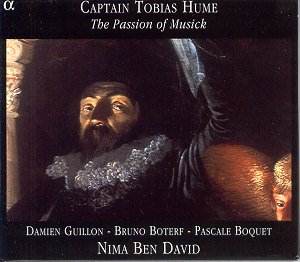Tobias Hume is certainly
one of the most remarkable personalities
in the history of music. He considered
himself first and foremost a soldier.
He travelled through Europe and served
in several armies as a mercenary. In
1624 he entered the London Charterhouse
as a "poor brother". Towards the end
of his life his living conditions had
severely worsened and in 1645 he died
a poor man.
But he wasn't only
a soldier. This apparently rather rude
and uncivilised character was one of
the most skilful players of the viol,
and played a considerable role in the
development of viol playing in England.
He published two collections of music.
'The First Book of Ayres', also known
as 'Musicall Humors', appeared in 1605
and was the first publication of music
for solo viol (with some additional
songs). It was the second in which the
viol was presented as a chordal instrument
which was to accompany the voice, as
an alternative to the lute. The first
composer to do so was Robert Johnson
in his 'First and Second Booke of Songs'
of 1601. In this collection Johnson
notated the viol part in French lute
tablature. He referred to these accompaniments
as being "after the leero fashion".
As the title of Hume's publication indicates,
he also wrote his pieces for the 'lyra-viol':
"for the Leero Viol to play alone".
One of the features of the 'lyra-viol',
or - usually - the viol played the 'lyra-way',
was the possibility to play in chords.
Hume was also one of
the first composers to ask for the strings
to be plucked, and to make use of the
technique of playing 'col legno' (with
the bow stick). He played an essential
role in inventing and promoting these
techniques which were to become standard
in English lyra-viol music.
The second collection
of compositions by Hume was 'Captaine
Humes Poeticall Musicke' of 1607, which
contained consort music and songs. In
this publication Hume didn't only ask
for a consort of viols, but also suggested
his music to be played by other instruments,
like lute and orpharion, or by a 'broken
consort', an ensemble of instruments
from different families. It is thought
the texts of the songs in this collection
were written by Hume himself, as they
seem to refer quite often to his own
life.
This disc contains
a selection from both collections. The
pieces represent the two sides of this
strange individual. On the one hand
there are works which reflect his activities
as a soldier, like the first two items
on the programme. And "Hume who drank
'small Beere' may have thought of being
inebriated with 'I am falling'", writes
Jonathan Dunford in the liner notes.
On the other hand we find very refined
and deeply melancholic pieces like 'Cease
leaden slumber' and 'What greater griefe',
which are at the same level as the best
that John Dowland wrote. Some consort
pieces are also of a reflective nature,
like 'The Passion of Musick' and 'Captain
Hume Lamentation'. The same kind of
compositions can be found among the
pieces for solo viol, like 'Deth' and
'Life'.
On this disc all music
is played by the viol or a consort of
viols with additional plucked instruments.
The vocal items are sung in period pronunciation.
I noticed a rolling "r", whereas in
other recordings which use period pronunciation
the "r" is spoken the 'American way'.
The contributions of both singers are
very good, even though Bruno Boterf
once forgets how to pronounce 'love'
the 'period way', and Damien Guillon
swallows the last letter of some words.
But his performance of 'Cease leaden
slumber' and 'What greater griefe' is
very moving. I just would like to hear
a little more ornamentation.
The playing of Nima
Ben David and her colleagues is excellent.
The character of the more reflective
pieces is well realised, but they also
accurately exploit the effects Hume
prescribes, for example the imitation
of drums and trumpets in 'A souldiers
Galliard'. The accompaniment of the
song 'Tobacco is like love' is very
evocative.
This is a worthy tribute
to one of the most interesting composers
in English music history, and strongly
recommended.
Johan van Veen












